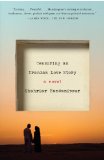Summary | Excerpt | Reading Guide | Reviews | Beyond the Book | Readalikes | Genres & Themes | Author Bio

Critics' Opinion:
Readers' Opinion:
First Published:
May 2009, 304 pages
Paperback:
Jun 2010, 304 pages
 Book Reviewed by:
Book Reviewed by:
Karen Rigby
Buy This Book
DEATH TO DICTATORSHIP, DEATH TO FREEDOM
In the air of Tehran, the scent of spring blossoms, carbon monoxide, and the perfumes and poisons of the tales of One Thousand and
One Nights, sway on top of each other, they whisper together. The city drifts in time.
In front of the main entrance of Tehran University, on Liberty Street, a crowd of students is gathered in political protest. With their fists raised they shout, “Death to captivity!” Across the street, members of the Party of God, with clenched fists and perhaps chains and brass knuckles in their pockets, shout “Death to the Liberal . . .”
The antiriot police, armed with the most sophisticated paraphernalia, including stun batons purchased from the West, stand facing the students. Both groups try, before they come to blows, to triumph over their opponents by shouting even louder. Drops of sweat ooze from faces and specks of spit spew from mouths. Fists, before pounding on heads, rise without miracle toward the sky.
It is perhaps because of these fists that from the sacred sky of Iran no miracle ever descends. Since one hundred and one years ago—when the first revolution for democracy triumphed in Iran—fists similar to these have risen toward the sky of a country with the greatest number of holy men, with the most prayers, tears, and religious lamentations; and today, I believe, the greatest pleas to God for speeding up the day of resurrection rise from Iran.
A short distance away, on the sidewalk, with her back to the steel fence lodged in the three-foot-tall stone wall surrounding Tehran University, stands a girl who, unlike most girls in the world but like most girls in Iran, is wearing a black headscarf and a long black coat as a coverall. She possesses a beauty common to all girls in love stories, a beauty that many girls around the world, and in Iran, who read these stories want to possess. If the ghosts of the thousands of poets who died a thousand years ago, seven hundred years ago, or four hundred years ago, and the spirit of those yet to be born—who, unlike the living, in the democracy of death amicably and tolerantly wander the streets of Tehran—see her large black eyes, they will liken them, as is customary of their poetry, to the sad eyes of a gazelle. An old simile for a pair of Oriental eyes that stole Lord Byron’s heart, and Arthur Rimbaud’s, too . . . But contrary to this clichéd simile, there is a mysterious look in this girl’s eyes. It is as if they possess the power to traverse time, the power to pass through the golden walls of harems or perhaps the firewalls of Web sites and Internet filters.
But the girl does not know that in precisely seven minutes and seven seconds, at the height of the clash between the students, the police, and the members of the Party of God, in the chaos of attacks and escapes, she will be knocked into with great force, she will fall back, her head will hit against a cement edge, and her sad Oriental eyes will forever close . . .
The girl attracts the attention of mysterious people who during political demonstrations in Iran monitor the scene from discreet corners and identify people. They point her out to one another. One of them, from a very professional angle, takes a photograph and films her. I know this girl is not a member of any political party, but she is timidly holding a sign that reads:
DEATH TO FREEDOM, DEATH TO CAPTIVITY
It is a strange slogan that I don’t believe has ever been seen or heard under the rule of any dictatorial, Communist, populist, or even so-called liberal regime. And I don’t believe it will ever be heard under the rule of any future regimes that for now remain nameless.
When they pause to catch their breath in between shouting their slogans, the students seeking freedom and democracy point to the girl and her sign and ask, “Who in the world is she? What is she trying to say?”
Excerpted from Censoring an Iranian Love Story by Shahriar Mandanipour Copyright © 2009 by Shahriar Mandanipour. Excerpted by permission of Knopf, a division of Random House, Inc. All rights reserved. No part of this excerpt may be reproduced or reprinted without permission in writing from the publisher.





The Flower Sisters
by Michelle Collins Anderson
From the new Fannie Flagg of the Ozarks, a richly-woven story of family, forgiveness, and reinvention.

The House on Biscayne Bay
by Chanel Cleeton
As death stalks a gothic mansion in Miami, the lives of two women intertwine as the past and present collide.

The Funeral Cryer by Wenyan Lu
Debut novelist Wenyan Lu brings us this witty yet profound story about one woman's midlife reawakening in contemporary rural China.
Your guide toexceptional books
BookBrowse seeks out and recommends the best in contemporary fiction and nonfiction—books that not only engage and entertain but also deepen our understanding of ourselves and the world around us.